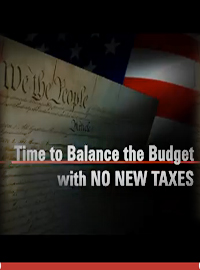| A Balanced Budget Amendment Doesn’t Have to Mean Higher Taxes – CFIF’s “One More Vote” Proposal Doesn’t |
 |
|
By Timothy H. Lee
Thursday, November 11 2010 |
A balanced budget amendment, in the wrong hands or crafted in the wrong form, can unfortunately provide a vehicle for big-government advocates to rationalize higher taxes. To illustrate, a federal government that dramatically expands spending only to throw up its hands and plead no alternative to tax hikes to satisfy a new balanced budget amendment is like an out-of-control teenager going on a credit card binge and using the inflated new balance to demand an allowance increase, lest dinnertime credit bureau calls start arriving. A balanced budget is desirable, but not if it means even higher taxes. This week, that dilemma advanced to the forefront of political discourse with the preliminary release of the White House deficit commission proposal, as well as instructive comments from conservative commentators Ed Morrissey of Hot Air and Byron York of the Washington Examiner. Speaking at a Heritage Foundation seminar this week on the future of the Tea Party, Morrissey accurately noted that, “A balanced budget amendment isn’t going to fix the problem” because it could be “used as a lever for higher taxes.” York agreed, saying that, “If you poll Republicans, most would favor a balanced budget amendment” that could divide established Republican leaders and Tea Party favorites in the new 2011 Congress. Morrissey’s and York’s concerns were immediately validated upon the release of the White House deficit commission’s interim report. The preliminary plan released by co-chairmen Alan Simpson and Clinton Administration Chief of Staff Erskine Bowles did well in attacking the unsustainable spending trajectories of such programs as Social Security and farm subsidies. In addition, however, the proposal would increase capital gains and dividend taxes, gasoline taxes and the Social Security taxable wage base. The plan also slows the rate at which tax brackets will adjust to inflation, thus raising taxes via “bracket creep.” As summarized by Americans for Tax Reform, the proposal “confirms what everyone has known – this commission is merely an excuse to raise net taxes on the American people.” The overriding problem with the commission’s plan is that it accepts the 2010 fiscal year as its spending base, thereby locking in the alarming spending increases of the Obama-Pelosi-Reid regime. That includes the failed “stimulus” that attempted to spend our way to prosperity, the bailouts, the pet projects and everything else they’ve heaped into our budget. Since 2008, federal spending has surged from approximately $25,000 per household to $30,000 per household, and jumped during that two-year span from its historical average of 20% of gross domestic product (GDP) to approximately 25% of GDP. Richard Rahn points out that, “Federal government spending and revenues in 1968 as a percentage of gross domestic product (GDP) were almost identical to the levels in 2008.” Indeed, incoming federal revenues reached their all-time peak in 2007, years after the 2001 and 2003 tax cuts that liberals attempt to scapegoat for our budgetary woes. Accordingly, our deficit and debt problem isn’t one of insufficient taxation. It’s a problem of overspending. Fortunately, there’s another solution. We at CFIF have launched our “One More Vote” campaign, which refers to the fact that Congress in 1995 fell just one vote short of endorsing a balanced budget amendment and sending it to the states for ratification. Under our proposal, a Constitutional amendment would require (1) a federal budget balanced annually, but also (2) a 60% supermajority vote in both the House of Representatives and Senate to create or increase taxes and (3) a 60% supermajority in both the House and Senate to raise the federal debt ceiling. Our 60% solution thus forces elected officials to restore fiscal sanity without relying upon economically-destructive tax hikes, and it saves our future generations from the unsustainable debt burdens presently amassing. The nation’s budget can be balanced without tax hikes. It simply requires a return to spending sanity, and a Constitutional amendment cementing that restraint. Enter CFIF’s “One More Vote.” |
Related Articles : |
























